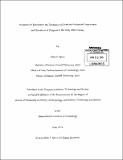Institutes for innovation : the emergence of academic-industrial cooperation and narratives of progress in the early 20th century
Author(s)
Spero, Ellan Fae
DownloadFull printable version (8.180Mb)
Alternative title
Emergence of academic-industrial cooperation and narratives of progress in the early 20th century
Other Contributors
Massachusetts Institute of Technology. Program in Science, Technology and Society.
Advisor
Anne McCants.
Terms of use
Metadata
Show full item recordAbstract
Early 20th century America is a critical context for understanding industrial innovation. Departing from a focus on innovation itself as manifested through the creation of new products and consumer opportunities, this project focuses instead on an important infrastructure for innovation - academic-industrial cooperation. Its particular emphasis is on the Mellon Institute for Industrial Research and the Massachusetts Institute of Technology. The Mellon Institute, an independent nonprofit entity devoted to the promotion of industrial research, contributed not only through its novel scientific work, but also through its efforts aimed at engaging broad audiences through popular writing. As a competing model, this dissertation also examines interdisciplinary laboratories and administrative structures at MIT to argue that these schemes for academic-industrial cooperation that began as an informal series of ad hoc arrangements between researchers and corporate partners were increasingly formalized and centralized into a unique educational model that combined fundamental science and industrially relevant research. Rarely used archival materials are drawn on to argue that "narratives of progress," shared stories and rhetoric that were conceived for, and deployed in the service of, a particular idea of creating a better world through the enterprise of science were essential components of institutional and industrial change. Mechanisms for academic-industrial cooperation, no matter how well organized or funded, could not stand alone without a foundational narrative to give them broader purpose and context. Building on an institutional approach and employing a novel analysis of narrative as text, the built environment, and exhibit, this study offers new perspective on sites of academic-industrial cooperation as institutes for innovation.
Description
Thesis: Ph. D. in History, Anthropology, and Science, Technology and Society (HASTS), Massachusetts Institute of Technology, Program in Science, Technology and Society, 2014. Cataloged from PDF version of thesis. Includes bibliographical references (pages 157-162).
Date issued
2014Department
Massachusetts Institute of Technology. Program in Science, Technology and SocietyPublisher
Massachusetts Institute of Technology
Keywords
Program in Science, Technology and Society.